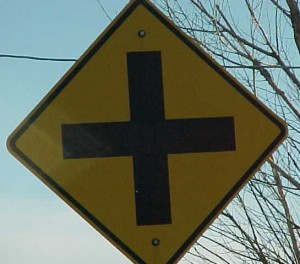The Challenge of Intersectional Justice – by Cynthia Holder Rich
Read Noushin Framke’s Essay, “Switching Costs”
Read Lisa Larges’ Essay, “Questions at the Intersection”
Read Emily West’s Essay, “A Faithful Toolbox”
Read Courtney Hoekstra’s Essay, “Intersections and Justice”
Read Theresa Cho’s Essay, “The Intersection Between Age, Race, and Justice: It’s Complicated”
Read Delfin Bautista’s Essay, “Sermonic Theologizing of Frontier Justice”
First, two stories
Story one: Last year my family attended a meeting of our local chapter of PFLAG. My husband, an ELCA pastor, was one of a panel of religious leaders who were to speak about their congregations’ ministries of welcome for LGBTQ persons and families. The congregations whose leaders spoke are all part of communions that make a particular note of LGBTQ welcome (and ordain persons deemed called to ministry who are non-heterosexual in identity and are in committed relationships or would like to keep that option open).[1] All the leaders spoke well and many moving stories were shared.
Our town is over 35% racial ethnic, with major concentrations of Hispanic/Latino and southeast Asian residents and smaller numbers of African-American, Native American and multiracial persons. While our community is religiously pluralistic, many of those who are not of the dominant culture are Christian and take part in the worship of local congregations. When an attendee questioned how the congregations welcome people who are different in terms of race, culture or class, the room fell silent. Finally, one of the leaders mentioned that in fact, African-American and Hispanic churches often have difficulty extending welcome to people of diverse sexual orientations and identities.
Story two: A dean at a church-related college made a report of administrative accomplishments over the last year to a community group, including a number of donors. One of the goals established for the period had been to engage with multicultural communities, in admissions, curriculum reform, and growing capacity of students, faculty, staff and administrators in intercultural competence.
The report was glowing and many accomplishments were lauded; but the planned-for multicultural engagement was absent from the report. When an audience member inquired of this goal and where the college was on this work, the administrator smiled and said they had decided not to undertake it. She explained that those involved became aware that this would be a significant challenge, and that after study, it was discerned that the college was not equipped to enter into this kind of initiative. Further, it was discerned that entering into this kind of process which might have thoroughgoing impacts that might distract the college from their central mission. The answer evidently satisfied the audience – no further questions were asked (at least in the public forum), and the group adjourned to dessert and coffee.
Justice work – required or optional?
I witnessed both the conversations described above personally. What struck me immediately in both cases was a lack of awareness of the ways that different justice spheres interact, inform and impact each other, for good or for ill.
In the first story, the congregations represented are among the most engaged in mission and involved in advocacy for justice in the region, places where preaching, teaching and ministries are informed by faithful commitments to an understanding of the radicality of Jesus’ good news and the call to believers to share this Gospel with a world in pain. In the second, the dean speaking was a woman scholar and administrator who had earned her stripes – and her scars – coming up through a male-dominated, hierarchical system. She was and continues to be a powerful advocate for women scholars, faculty and students and for carving out a space for women’s voices in academe, often a hostile context for anyone who doesn’t fit the constructed and expected norm for leadership and the scholarly endeavor.
So, in both these cases, the leaders involved are committed to justice – at least, the forms and arenas of justice that they see, define, choose, or to which they feel called to engage. And then – there are the kinds of justice that they choose not to engage.
Two responses emerge quickly – what’s up with that, and/or, so what?
This week on ecclesio.com
This is a special week on ecclesio.com. This website debuted over a year ago, and in the first year of its life, over 40 guest authors and conversation partners participated and a great number of key issues facing the church were addressed and discussed. We also grew to average more than 1500 pageviews a week. (pause for deafening applause, ovations, encores – thank you, thank you very much!)
In that first year, the issue of sexuality was not a named subject for conversation in this space (although it appeared in a number of posted essays). Early in the last year, I discussed how to take on this issue in ways that might assist people to converse about the issue with each other and not at or past each other. I struggled, entered into email conversation with friends and colleagues, and didn’t find a way to engage it. I let it go!
But you see, at the core of my being I believe that justice is justice is justice – that when one suffers we all suffer, and when one rejoices we all get to rejoice. (For more eloquence than I can offer, review Paul’s rhetoric in Romans 12 or I Corinthians 12.) With the passage this year of an amendment to the Presbyterian Church (USA) constitution that made legal ordination for all people called to ministry regardless of sexual orientation or identity, and the subsequent celebrations and less positive spasms of reaction (including a meeting of 2000 Presbyterians in August, many of whom see this move as violating the core of what it means to be Presbyterian – and possibly, Christian), the importance of unwavering commitment to the intersectional nature of justice has become clear and crucial.
I call this moment crucial because the word has “cross” at its root, and those things that are crucial put us at a crossroad, where we must choose which way to go. Crossroads happen frequently for we who follow Jesus, and see his call at the heart, or crux, of the Gospel’s mandate. At crossroads, two (or more) issues present together – and we are dealing with crucial crossroads of issues this week in this space.
Each of the writers this week will be engaging at least two spheres of justice, and each will acknowledge the place from where they start. I am a EuroAmerican, highly educated, ordained Presbyterian. I am a wife, mother, sister and daughter. I am part of a multigenerational line of clergy. I am part of a multigenerational, adoptive, transracial family. My parents’ justice advocacy work when I was young informed my own faith journey and convinced me that following Jesus without commitment to justice is an empty exercise. The arenas where this all gets expressed most for me are race, class, gender and (a related issue) access to education for all, including those with disabilities.
As a white feminist engaged in racial justice, I am aware that I can miss issues that are clear to others. Bloggers Hepshiba and Ms. Ito have addressed this in chilling ways that force me to reflect and confess about power, privilege and its use, misuse and abuse in justice work. This is of course not a new issue; Lori Ginzberg’s fine biography of Elizabeth Cady Stanton, one of the foremothers of the feminist movement, describes Stanton’s frustration at liberating movements for African-American men. Stanton, like many others before and since, made the mistake of viewing justice as a zero sum game. That Black men would get the right to vote before white women seemed the height of injustice to Stanton, as well as thoroughly impractical – a decision not informed, as she viewed it, by the facts. White women would use this right better, and so should be granted it, Stanton thought. The issues of the blinding capacity of power and privilege are not new.
In the area of sexuality orientation and identity justice, race also emerges as an issue – one that I, having read the rhetoric in my own communion for decades, have rarely heard voiced. Lisa Weiner-Mahfuz, who blogs for The Bilerico Project, does not mince words. She outlines her sense of how white activists, in order to make points and look inclusive, use and abuse LGBTQ people of color while not being willing to integrate their perspectives into the direction of the work.
In my own justice ministry and in our society, the belief that racial justice is in the “been there, done that” phase so now we can move on is prevalent and hard to combat. Yet, in all the justice work I do, view, and hear about, the color of people’s skin and their cultural and linguistic background continues to impact the way lives proceed, outcomes are achieved, and people are understood, perceived and received. Everything I have learned suggests that the intersectional nature of justice and those who seek it continues, and must be respected by all who believe in and work for justice.
Read Noushin Framke’s Essay, “Switching Costs”
Read Lisa Larges’ Essay, “Questions at the Intersection”
Read Emily West’s Essay, “A Faithful Toolbox”
Read Courtney Hoekstra’s Essay, “Intersections and Justice”
Read Theresa Cho’s Essay, “The Intersection Between Age, Race, and Justice: It’s Complicated”
Read Delfin Bautista’s Essay, “Sermonic Theologizing of Frontier Justice”
[1] The meeting referenced was held before the Presbyterian Church (USA) decision on Overture 10-A.



Pingback: The Intersection between Age, Race, and Justice: It’s Complicated « Still Waters